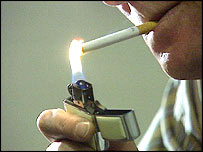Debates over possible bans on smoking and smacking have raised the inevitable arguments about a nanny state.
It is a charge more regularly aimed at Labour governments and - as with so many other "Old Labour" tags - is one Tony Blair is eager to avoid.
Limited ban on smacking expected
But he faces powerful lobby groups on both sides of these arguments. And doing nothing is beginning to look less and less an option.
Both provoke heated debate with, in the broadest terms, opponents tending to argue that, whatever the relative merits of the proposals, these areas are simply none of the government's business.
Supporters regularly counter that this is indeed about human rights - in these cases the rights of children and non-smokers.
But these are complex arguments and often spark highly-charged debate about, for example, whose rights governments should be protecting first and to what extent ministers should impose lifestyle choices on individuals.
Oncoming train
The politics, however, is far more straightforward and ultimately boils down to the simple question of whether these proposals are vote winners or losers. Are they ideas whose time has come?
And, at the moment at least, the answer to that appears to be a solid "don't know" - which goes a long way to explaining the government's caution on these issues.
The last thing the prime minister needs at the moment is to lift the lid on fresh eruptions of protest similar to those sparked by his anti-hunting moves.
Smoking bans have proved popular
At the same time, however, he can spot an upcoming train when he sees one and many - even opponents of these suggested laws - often claim they believe they are inevitable.
On smoking, there appears to be widespread public support for a ban in public places and similar laws in New York and Ireland have been deemed a success.
Smacking is a less clear cut and probably more emotive issue, but there is pressure from the EU which may ultimately lead to some sort of ban.
Bitten off
And it is certainly the case that previous laws on the wearing of seats belts and motorcycle crash helmets, for example, while initially sparking controversy very rapidly became accepted.
And few argue that drink drive laws or even the more recent ban on using mobile phones when driving have not proved widely popular.
These all attracted allegations of the nanny state from some quarters when they were first proposed but appear now to be generally accepted.
So the prime minister has put a toe into these dangerous new waters.
It remains to be seen whether it gets bitten off.

